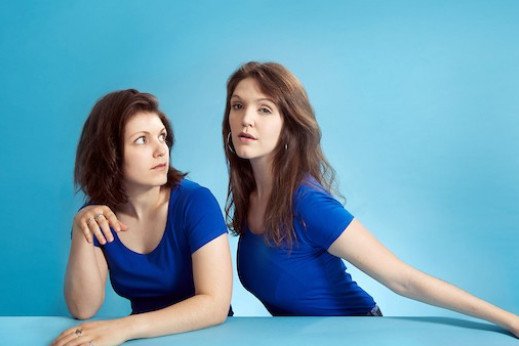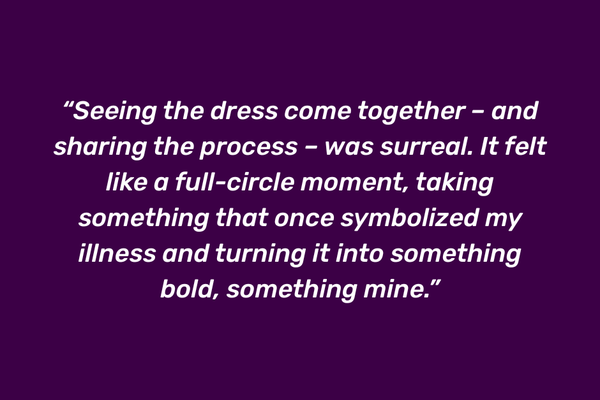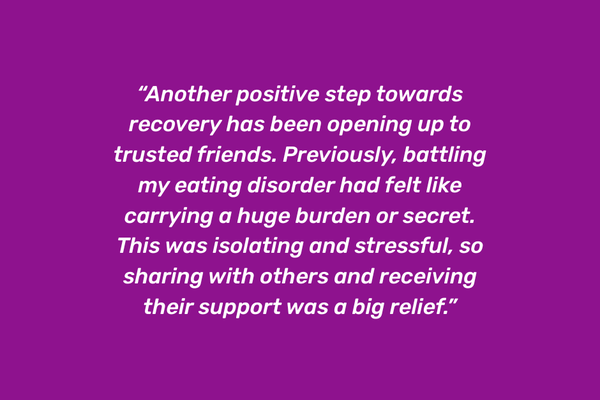My daughter Ellen has bulimia but working towards recovery step by step. She is a talented composer and I’m very proud of her – especially the fact that she never gives up.
I was for some years her main carer, but in the last ten years we have worked together professionally too, as Ellen sought to balance her recovery with developing her career. Now she shares a home with The Lovely Pete, her supportive partner.
Sometimes it has felt like no progress is being made, and in the dark times we all feel things will never get better. But looking back over those ten years, I can see Ellen has made some remarkable achievements, and maybe other parents, carers and partners “stuck in the middle” might like to read a blog from that perspective.
I hope Ellen reads it too and is reminded of what more she can still achieve in future if she allows herself to continue to believe in herself – as so many others do! In 2011, with a Big Lottery grant of nearly £10k, a group of professional musicians and dancers worked with Ellen on a specially composed piece of music choreographed to represent the battles of someone with an eating disorder.
The work consists of three separate dances depicting mind/body conflict. The title, Dance 123, has dual meaning: the composition consists of three dances, but it also explains how recovery into a balanced state of mind/body has to be taken in stages; it won’t happen at once.
The work is scored for cello, piano, four voices, external sounds and three dancers. It depicts not just struggles with an eating disorder but any conflict between mind and body as a result of body dysmorphia.
Musicians and dancers take on the roles of the body and mind throughout the work while the external sounds used represent the outside world and the positive and negative effects they can have.
Ellie’s rationale was that:
“When you dance, both body and mind are in harmony, just as they are when you are well, but with an eating disorder the mind and body become separated and conflict; old routines need to be broken and new routines learned to produce a new dance…a series of steps.”
Body Image Dance was formed to deliver what Ellie imagined. A group of business people with different skills got together to act as the commissioners and to deal with the finance and Ellie chose the professional artists to perform her music and choreograph the steps to tell her story.
We had considerable support from Newcastle under Lyme College and Staffordshire University who saw the growing need for innovative approaches to tackling eating disorders.
The work was premiered in the dining hall of Newcastle-under-Lyme College, Staffordshire before an invited audience of members of the public as well as senior representatives from local government and health groups.
The film (made by college students) of the performance was later shown at Stoke Film Theatre, and we took the film and live excerpts to Birmingham and Stafford Arts Festivals.
The icing on the cake was that in 2013 the Universities of Staffordshire and Derby both carried out separate studies using Dance 123 into the use of dance in helping in recovery.
I’d love for more people to see their studies, which is why I’m writing this blog. Staffordshire University’s study (Dance and body image; young people’s experience of a dance movement psychotherapy session – Grogan et al published May 2013) and Derby’s (The rationale behind a dance movement psychotherapy intervention – Bunce et al published October 2013) together with our full body of work and more information can be seen on our Facebook page.
Even better, in the last four years Ellie has already developed her composing practice based on the success of Dance 123 and has three new projects in the pipeline – all funded and supported!
In her words: “I have suffered with an eating disorder for nearly half my life and been hospitalised three times. It’s still very much a constant battle but I found writing Dance 123, using my love of music and dance as a means of self-expression and an aid to self- awareness, has led to increased confidence and belief in myself, which can only help in the recovery process. I was inspired to write more music for community projects since completing Dance 123, including a major work for performance in a Stoke on Trent working pottery museum in 2013. As a mature student I graduated from Bangor University last year with a distinction in a Masters in Composition and I have just completed another major Community work commemorating the Great War, working with professional artists as well as local schoolchildren. I’d like to encourage others to use the arts as a way to increase mind/body balance as part of their recovery, so I’m pleased to share Dance 123 with others.”
Thank you for taking the time to read this. If it helps just one person to recognize how tuning in to their creative side can help give a sense of achievement, restore confidence and a balanced sense of self then it will be worth it.
With one step at a time you can regain your balance and I hope other parents and partners will be encouraged to battle on too.
Contributed by Wendy, Ellie's mum and BID Project Manager
We Learnt A Lot About Ourselves – And Each Other
8 October 2018We didn’t speak about it at the time, about what it was like for Kate, or what it was like for her, going through this thing that we were both going through: Alex’s eating disorder.
Estranha's Twogether Fundraiser
22 April 2025Seeing the dress come together – and sharing the process – was surreal. It felt like a full-circle moment.
Recovery Hope - Bee's story
22 April 2025I am sharing my story in the hope that others may find it relatable or helpful to their own recovery journeys.


